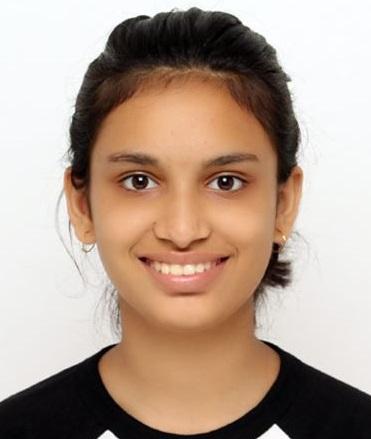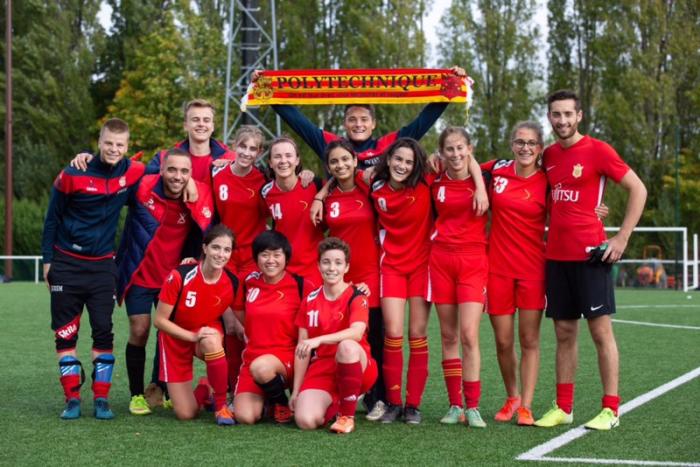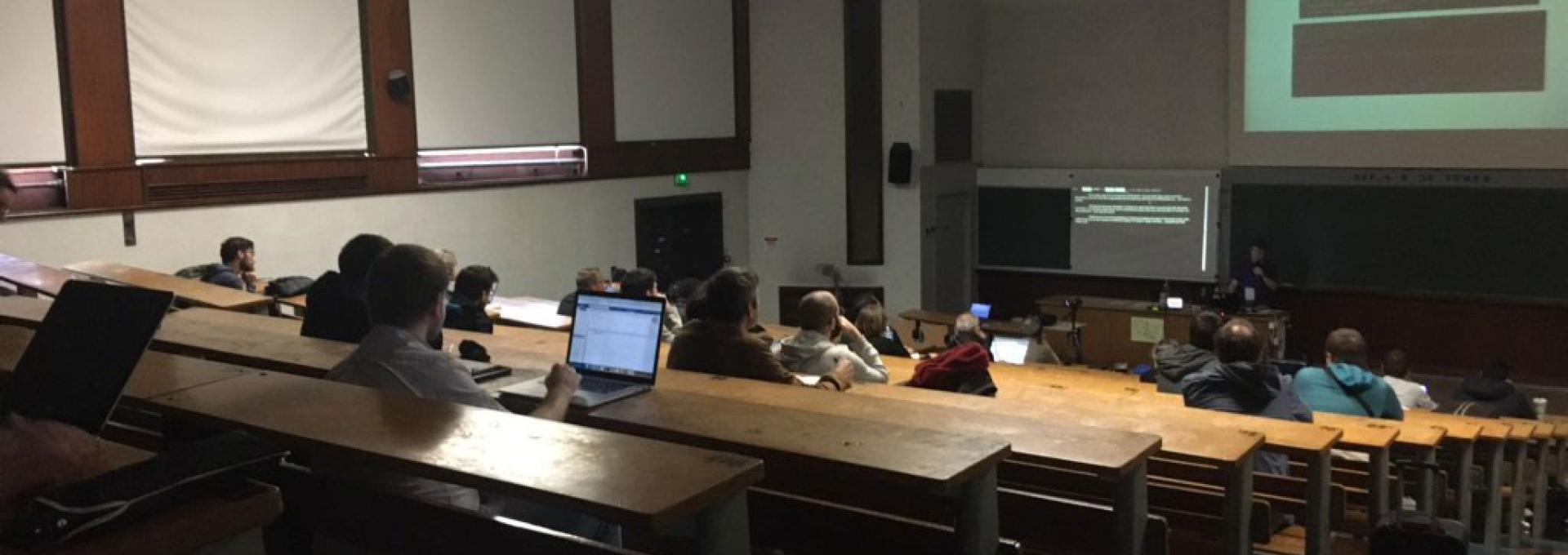This article is part of the "Women in science" series, which shows the careers of female students at École Polytechnique
Sonal is a 2nd year student in Mathematics and Computer Science within the Bachelor Program. She talked about her experience at École Polytechnique and her many extracurricular activities. She also accepted to share with us her opinion on the status of Women in Science.

Why did you choose École Polytechnique?
In high school I was interested in research. I knew about École Polytechnique’s reputation and its various academic domains. I immediately thought it would be a great place to get more opportunities to explore the research area. Moreover, a lot of other universities typically offer one major only, for example in mathematics, and not double majors such as in the Bachelor Program. To sum up, I loved the flexibility offered by the Bachelor program that could allow me to explore different subjects and also the opportunity to work closely with instructors thanks to the small classes.
How did you get to know the Bachelor program? Why do you think the program is interesting for international students?
I wanted to study abroad but it is difficult to find programs taught entirely in English at a relatively affordable cost, so the Bachelor program with its internationally available financial aid programmes is really unique in that way. It also allows you to be in contact with people from all over the world, thus giving you the opportunity to immerse yourself in the French culture while learning more about countries you may not have heard of before!
Could you please tell us more about the computer program you have developed?
During the previous summer, I worked as an intern in the Centre de Recherche en Économie et Statistique (CRESt) where I was a research assistant in the Computational Economics department. The team uses tools in computer science to solve problems in economics. It was very interesting for me to see how the skills we learn in class, such as programming, can be applied to research in another field. My professor and co-workers were working on tracking social movements on Twitter, such as the Yellow Vests movement in France, to get a sense of the impact social media can have on real political change. My primary task as an intern was to write code to calculate Twitter Penetration Rates, which means finding the concentration of Twitter usage in a given region and time period. I also created maps to represent this data. It allowed my co-workers to visualize the concentrations with different levels of accuracy (country level, state level, city level). During my final week, I wrote code for a simple tweet analyser: for any given tweet it would try to look at the words and analyse if it generally conveys a positive, negative or neutral feeling. The goal is to get a better sense of how people generally react to a social movement and thus get a bigger picture of the impact of that movement.
You also worked with “Girls in Tech” and “Code Club”. Could you tell us more about it?
I worked with the association “Girls in Tech” in Paris where I taught middle and high school girls simple programs such as JavaScript, Scratch3 and HTML to build basic interactive games. I also joined “Code Club” which is affiliated to the "RaspberryPi Foundation", a UK-based charity whose mission is to “put the power of computing and digital making into the hands of people all over the world”. I thus developed content for the website directed towards a younger audience who is typically just starting to get into computer science. In my opinion, one of the big problems with computer science is how inaccessible it is. When you first want to get into it, almost all the information on the Internet seems too advanced. It is not simplified enough and it looks very intimidating. So I wanted to help out as much as I could to teach and encourage girls in an easy, interactive and fun way.
You presented your research work at Pycon in November. Could you please tell us more about it?
Pycon is the largest annual gathering for the community that uses the open-source Python programming language. My conference at Pycon was about how to use certain interactive tools and also how to conduct simple language processing in Python for Twitter especially. I went to Bordeaux to present my work during a 30 minutes conference. I think it is of interest to a lot of people because one way to have a sense of the general feeling of people on a certain topic is to look at Twitter because it is very popular and you get a lot of data which allows to come up with conclusions.
Do you have any extracurricular activities?
The summer before joining École Polytechnique, I was working as a social media analyst for the United Nations volunteer branch in India. I had to analyse the demographics and audience targets in order to make localised campaigns. I was able to increase viewership of two platforms (Facebook and Instagram) from 15,000 unique visitors/subscribers to 18,000 in two months. I am also contributing to an open source project, namely Mapbox, which creates customs maps API like Google Maps or Apple Maps. It allows you to have more unique visualisations while still caring for your customers data. And open source also means it is free! Furthermore, I recently became a member of an international organisation called “Women in Machine Learning and Data Science”. Its goal is to support and promote women and gender minorities who are practicing, studying or are interested in the fields of machine learning and data science. Finally, I am also part of the Women’s Soccer team in Polytechnique. We just recently won first place at the “Coupe de l’X”!
We talk a lot today about women and their position in the workplace among other matters.
In your opinion, how does École Polytechnique support women in science?
As a Bachelor student, we are told about many opportunities within École Polytechnique itself. When we do approach professors asking for research opportunities, they do not discriminate at all based on the fact that you are a woman or not. They are very inclusive in that way.Moreover, initiatives like the Science Camp or the Science Fair that l’X recently organised allow women in high school to learn more about science.
Why do you think women are less represented in science?
In high school, I was the only girl within the high-level physics class. It has to do with cultural pressure that limits women a lot. If you are constantly told that you may not be good enough, that you do not belong there, it really does affect you. In India, the country where I come from, overall it is quite normal that women grow up to serve their families as housewives as they see that as the role they have to play in society. While there is nothing wrong with caring for your family as a housewife, it does raise a question about their freedom to choose and the debate about how society can limit a lot the opportunities they get. Education as a whole is not that accessible, in terms of financial and geographical means in India. The country, unfortunately, does not have a very inclusive educational system yet. But in my personal experience, I have always been encouraged by my family, they were really supportive. I feel incredibly privileged to have received the education I got and I am fully aware that I am in the minority in this aspect.
What are the main challenges women are facing today?
The first challenge, which is not only faced by women but by almost everybody, is language. Language is a huge barrier for education. For example, a lot of education material online are in English and not everybody speaks English. Especially when you consider India being such a diverse linguistic country, almost everyone speaks at least three languages and they are not the same across the whole country, it really does limit the access you get. That is why I am working on a project to translate a lot of recordings from English to Hindi making it easier for people who do not speak English. The second issue is culture. It is important to not only accept people getting access to different kind of fields they are interested in but it is essential to encourage them as well. If you are supported, you feel more compelled to spend time on it and enjoy the work you are doing.
Do you have any role model of women in science?
I do not have a specific role model. The fact that we see more and more women in this field, especially in the tech one, is really inspiring. If we go back a decade ago, which is not that far away, there were just a few women in board positions, which are very male dominated. The evolution is therefore very positive. I am also thinking about Anita Borg, a famous American computer scientist, who fought for equality. She wanted to include more women in the field itself and have their opinion heard. She can be considered as a model for many people.
At École Polytechnique, we strive to promote gender equality and encourage women to get in science. In order to encourage and support talented female students, École Polytechnique Foundation has created the "Women in Science" scholarship.

